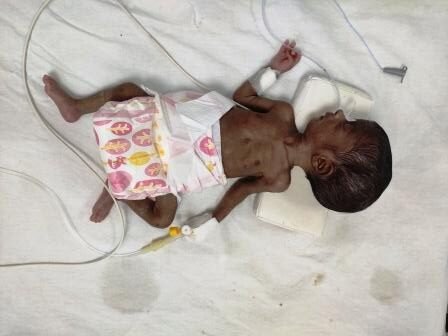Table of Contents
Low Birth Weight Newborn Care and Nursing Assessment
Low Birth Weight New Born care is very essential to preserve LBW baby
Low Birth Weight Neonates Weighting less than 2500 gm irrespective of gestational age at birth are termed as Low Birth Weight . These includes Preterm and Term babies
Causes of Preterm Birth
(a) Maternal factors
1 Medical disease of the mother during pregnancy
2 Complications of pregnancy e.g., placenta previa and antepartum hemorrhage.
3 Incompetence of cervix,
4 Maternal infections,
5 Previous premature delivery.
(b) Fetal factors
1 Multiple pregnancies.
2 Congenital malformations,
(c) Medical factors,
The delivery of the fetus may have to be induced before full term on medical grounds under the following circumstances:
- Uncontrolled diabetes mellitus in the mother,
-
Severe cardiac illness.
-
Hypertension, toxemia,
-
Fetal hypoxia and fetal distress,
-
Severe rhesus iso-immunization in the mother or hydrops fetalis,
-
Severe intrauterine growth retardation,
(d) Iatrogenic Improper diagnosis of maturity in elective deliveries
Major Problems in Low Birth Weight Babies
Hypothermia,
Perinatal Asphyxia,
Hyaline Membrane Disease,
Pulmonary Hemorrhage,
Pneumonia,
Pneumothorax,
Bronchopulmonary Dysplasia,
Bacterial Sepsis,
Hypoglycemia,
Hypocalcemia
Apnea,
Anemia,
Hyperbilirubinemia,
Meconium Aspiration,
Polycythemia,
Feeding Problems,
Poor Weight Gain,
Low Birth Weight Baby Care at Birth
High-Risk Mothers should be early identified as early as possible during the course of pregnancy and plan for the right place to treat mother and child as well health care felicities available i.e, Good quality Maternity and Neonatal Care felicities Suitable place of delivery ‘in utero’ transfer to a Place with optimum facilities if an LBW delivery is anticipated. Prevention of hypothermia Efficient resuscitation
The appropriate place of care
Birth weight>1800gms home care KMC – Kangaroo Mother care if the baby is Otherwise well Birth weight 1500-1800gms secondary level new Born unit Birth weight<1500gms tertiary levels newborn care-intensive care
Thermal protection: Delay bathing Maternal contact Warm room External heat source (incubator radiant warmer)
Fluids and feeds: IV fluids for very small babies and those who are Sick Expressed breast milk with gavages or Katori spoon
Direct breastfeeding Monitoring and early detection of complication Weight and other clinical signs Electronic monitoring Biochemical monitoring
Principles of management for low birth weight neonates: Although the preterm and SFD neonates have Physiological differences,
the principle of management is common. Physical assessment of the new born.
Physical assessment (head to toe assessment): The first assessment of the newborn is done immediately after a birth second more detailed examination is the lobe within 1st hour or during admission Third assessment is before discharge.Brief assessment in each shift.
Nursing Assessment for Low Birth Weight babies
General Measurement:
I.Vital signs: Respiration determines the rate, rhythm. T
technique: Observe abdominal movement for one-minute Normal findings: R.R:40-60 breath minute
Cry R.R. sleep R.R.
Abnormal finding:
Tachypnea R.R>60min, Apnea, 20 seconds or more. Weighing the baby Weight the baby before Transfer from the delivery Room, Initiate breastfeeding within 30 minutes of Birth,
What are the danger signs of New born?
Who is giving to Care of New Born Baby they Need to aware that baby can get sick and die,
Difficulty in breathing, Chest In drawing Very Cold, Bluish Dislocation of Palms and Hands, Fever, Convulsions and Fits, Difficulty in Sucking or Breastfeeding, Redness of Umbilical Card or Pus Discharge, Swelling, Redness of eyes or Pus, Yellowish Skin, Rash on the Skin, Pustules,
A guide for Parents Newborn Care at Home,
You are ready to care for the newborn at home and start life with your new baby,
These Baby Care tips help parents get confident about newborn caring,
Handling of Newborn baby Reduce Prevent cross-infection by Hand wash before Touching the baby with Soap and Water or Sanitizer, Make sure Hand Wash that who are caring for your baby,
Support baby’s Neck and Head who you’re lifting the baby every Time, Keep Baby Head Upright position when transferring to the credit or Crib,
Never shake your baby Remember your baby is Not a Doll, Shacking of Baby can cause bleeding in Brain it leads to death,
List out common neonatal disorders?
Hyperbilirubinemia Pathological jaundice Physiological jaundice Haemolytic disorder of Newborn ABO incompatibility Rh incompatibility Neonatal hypoglycemia Neonatal sepsis

Leave a ReplyCancel reply